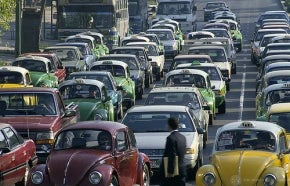
‘On the cusp of changes’ is an understatement. There are a half-dozen possible tipping points, crossing any of which gets us into scary unchartered territory. Ocean acidity and coral die-off; drying the Amazon rainforest; run away growing fossil fuel use; loss of ice sheets; large scale melting of permafrost: and the biggest tipping point of all – our amazing inability to come anywhere near an agreement limiting global GHG emissions and warming.
The article argues that unless we seriously curb the rate of growth of GHG emissions within the next 10 years, we will cross tipping points that lead to significant and irreversible global warming. And yet, all that was agreed at COP17 in Durban last year is for countries to reach an agreement by 2015 for action that will not start until 2020. Too little too late, according to the science.
The world will likely only see 450 ppm CO2 concentrations from our rear-view mirror as we hurtle down the express lane to at least 550 ppm CO2 and a 5 degree warming. What the article doesn’t say is that we will need to figure out how to geo-engineer some sort of amelioration. Good luck with that. We can’t agree on the much easier aspects of limiting GHG emissions; how will we ever agree on something as complicated as managing the planet’s climate?
So who should be most afraid? Cities. When the going gets rough – and it surely will – the heavy lifting will fall to the world’s cities. Cities by their location and large dense populations are on the front lines of climate impacts. Rising sea level, water and food scarcity, heat waves, the impacts are all most severe on cities, especially those in the developing countries that will face the largest impacts with fewest resources to respond.
Some smart cities are already preparing for climate challenges: Increasing resilience by hardening infrastructure, improving public communication and early warning systems, and focusing on basic services like keeping solid waste out of drains and getting water and sanitation into all neighborhoods. Cities need to act now. The good thing is they are not waiting for their national governments to act.


Join the Conversation